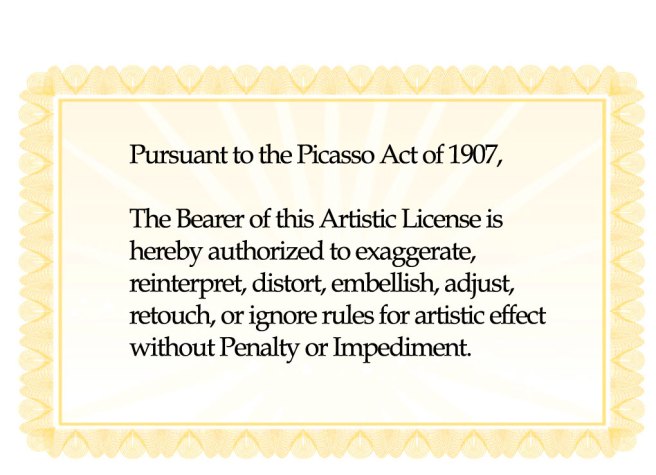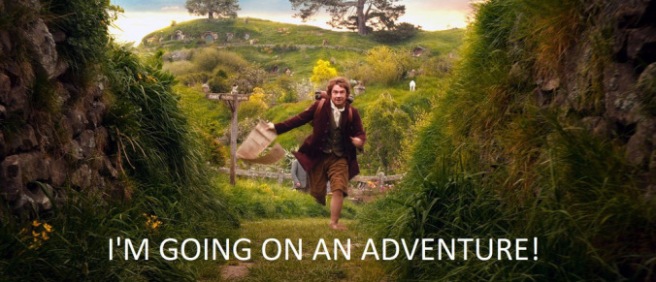As a creator, I am a card-carrying artist; that is to say I have an artistic license. As an author it gives me the authority to make up words legitimately (an argument my girlfriend may or may not accept as legitimate), but it also gives me the freedom to play fast and loose with some of the rules, some of the time.

“Well gee, thanks for clearing that up!”
“I’m getting to the details in a second!”
That hypothetical audience member is getting sassy! By way of general definition, artistic license lets authors distort or shift things (within reason) for the sake of the story. It is a commonly accepted defense against knit pickers who would tear a story apart for small inaccuracies. It ties heavily into the willing suspension of disbelief since it refers to how far readers will let you push facts before they object (and everyone draws the line differently) as well as the rule of cool (we all know giant robots are impractical, but they’re cool so we accept their existence for the sake of the story, for example). Whenever an author effectively says “I know this isn’t how it really works, but I’m changing it a bit so it fits my story” they are exercising their artistic license.
There are a few reasons this is important to have. First off the reader may have expectations that don’t match reality. For example I know that no sound waves can travel through the vacuum of space, so there would be no explosions in a starship battle, but readers probably expect there to be (look at Star Wars), so I would write them in. I know it’s inaccurate and the reader might know that too, but there is an unspoken agreement that it’s okay. Secondly, it’s important because writers should not have to be scientists. I’m not against a healthy dose of research, but when it comes to matters that require great technical skill or training to understand, I think it’s okay to let some of the little details slide. (For my part, I am more accepting of those who know how it should be and alter something intentionally as opposed to those who do what fits out of ignorance with no attempt to find out first)
The biggest up side to this is it gives the author a bit more freedom to tell the story, which is really what it’s all about. The biggest drawback is that it opens the door to those who would use it as an excuse to not do any research on their subject material. And sometimes it may be an excuse for some lazy writing (for the sake of convenience rather than serving the story). There has to be a balance, and that balance will vary by genre and by style. As a sci-fi writer, I lean towards the hard sci-fi end of the spectrum, so I have a bit less wiggle room, but that’s due to a personal preference. I like to delve into why my creations can do what they do, rather than saying “look it’s super strong and can fly because science!” I’m sure some people will appreciate the approach and others will think I use too much techno babble. But it’s not about pleasing everyone. It’s about what serves your purpose. After that if you can just stay consistent, you’re good to go. And above all, always be sure to have your artistic license handy.
I keep mine in my wallet right next to my license to kill and my license to thrill…I’m a highly qualified individual.






